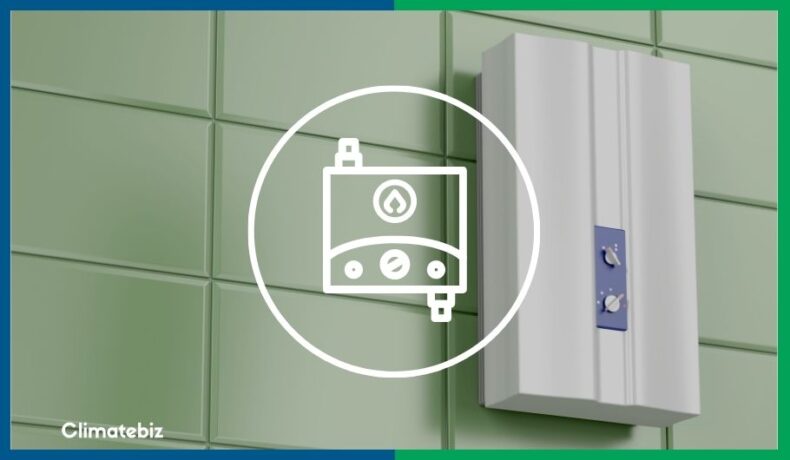Tankless water heater cost — the final hurdle separating you from your new, energy-efficient water heater.
Water heating systems account for around 20% of your home’s total energy use. It stands to reason why many households are turning to tankless water heaters (TWHs) for their water heating demands.
Don’t believe us? How’s this for size — by the end of 2027, the global tankless water heater market is estimated to account for US$ 29.7 billion in terms of revenue, growing at a CAGR of 5.4% during the forecast period (2019-2027).
The above statistics are undeniable proof that households across the U.S are buying into the sheer efficiency these water heating systems offer.
We’ve caught your attention now, haven’t we?
Good! But as we mentioned, you must know more about tankless heater costs before purchasing one.
So, without further ado, here’s what you can expect.
Table of Contents
How Much Do Tankless Water Heaters Cost To Buy?
The price of a tankless water heater (TWH) varies greatly. It ranges from just over $100 for a mini electric point-of-use water heater to over $2500 for a large whole-house gas-fired water heater.
However, there’s more to TWH cost than the above info. Let’s dig a little deeper, shall we?
Power Source
TWHs use two primary sources of energy: gas and electricity.
Gas
Gas-fired TWHs have a far more complex installation process; they are larger than their electric counterparts and require a venting system that provides adequate airflow for combustion.
On the upside, they tend to have higher flow rates than electrical water heaters.
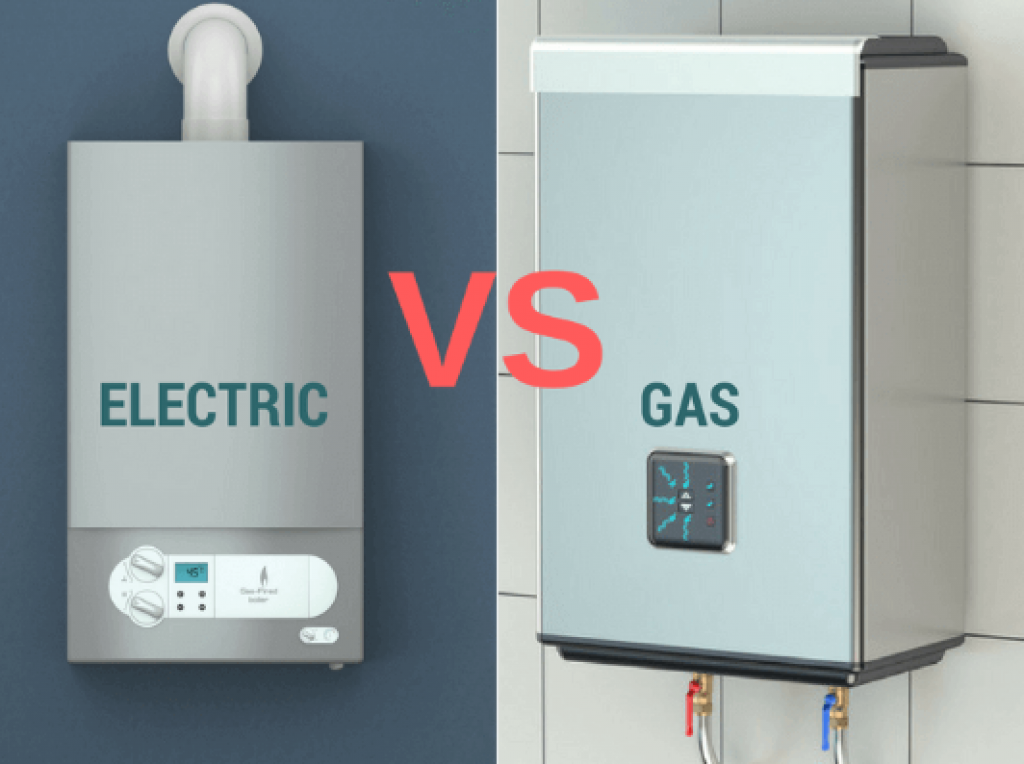
Electric
Electric TWHs are far easier to install; they are smaller than their gas counterparts (making them easier to fit in small spaces) and do not require a complex venting system to run efficiently.
What’s more, they’re cheaper to run. Yes, you read that correctly — even though these heaters run on electricity, they are cheaper to run. Why? Because electric TWHs are much more efficient (98 to 99%) than gas-fired TWHs (80% to 85%).
This increased efficiency level offsets gas is generally cheaper than electricity (sorry, gas lovers).
Sizing
There are two types of tankless water heaters: whole-house & point-of-use.
Whole-House
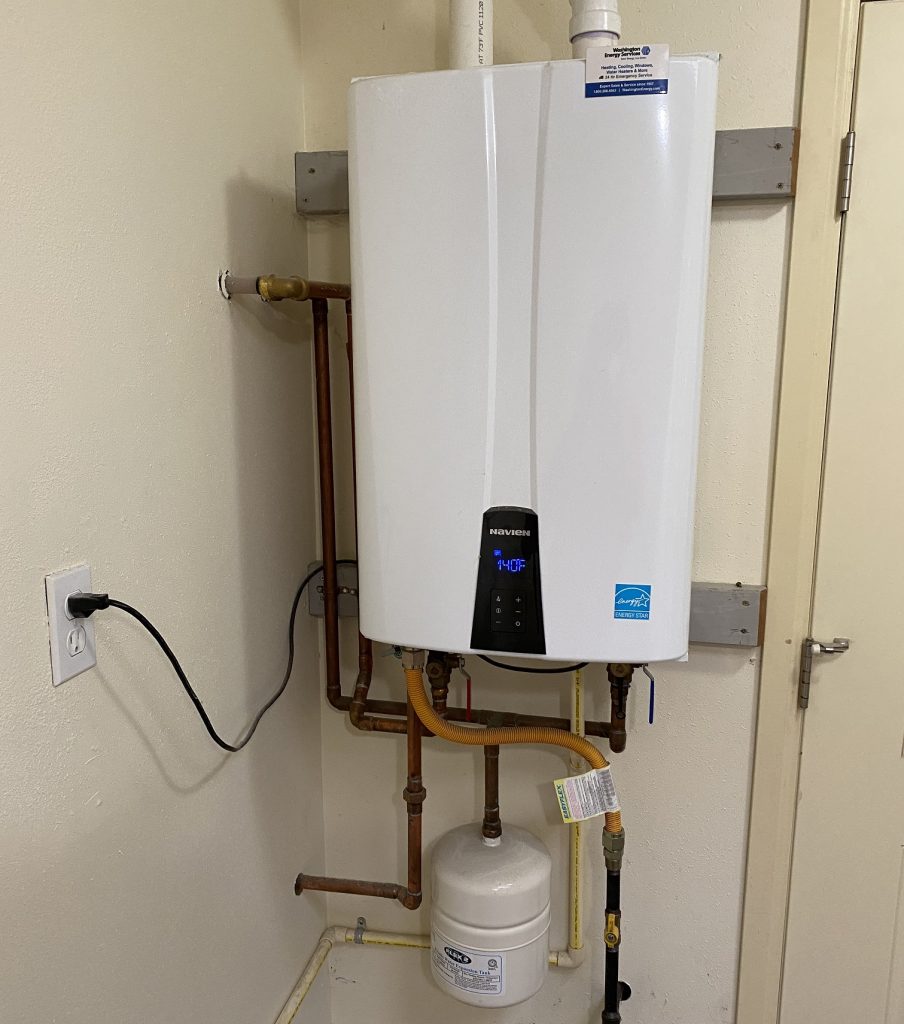
Whole-house TWHs, also known as centralized water heaters, are large and have high gallons per minute (GPM) flow rate.
This increased capacity means that they’re able to handle water pressure demand from more than one faucet at a time.
For instance, a whole-house water heater can supply hot water to a running shower, dishwasher, and washing machine, all at the same time.
Naturally, this makes them a more expensive option than their point-of-use counterparts.
Technically speaking, you can install multiple point-of-use TWHs to achieve the same end goal, but that process could be rather tedious.
Point-Of-Use (POU)
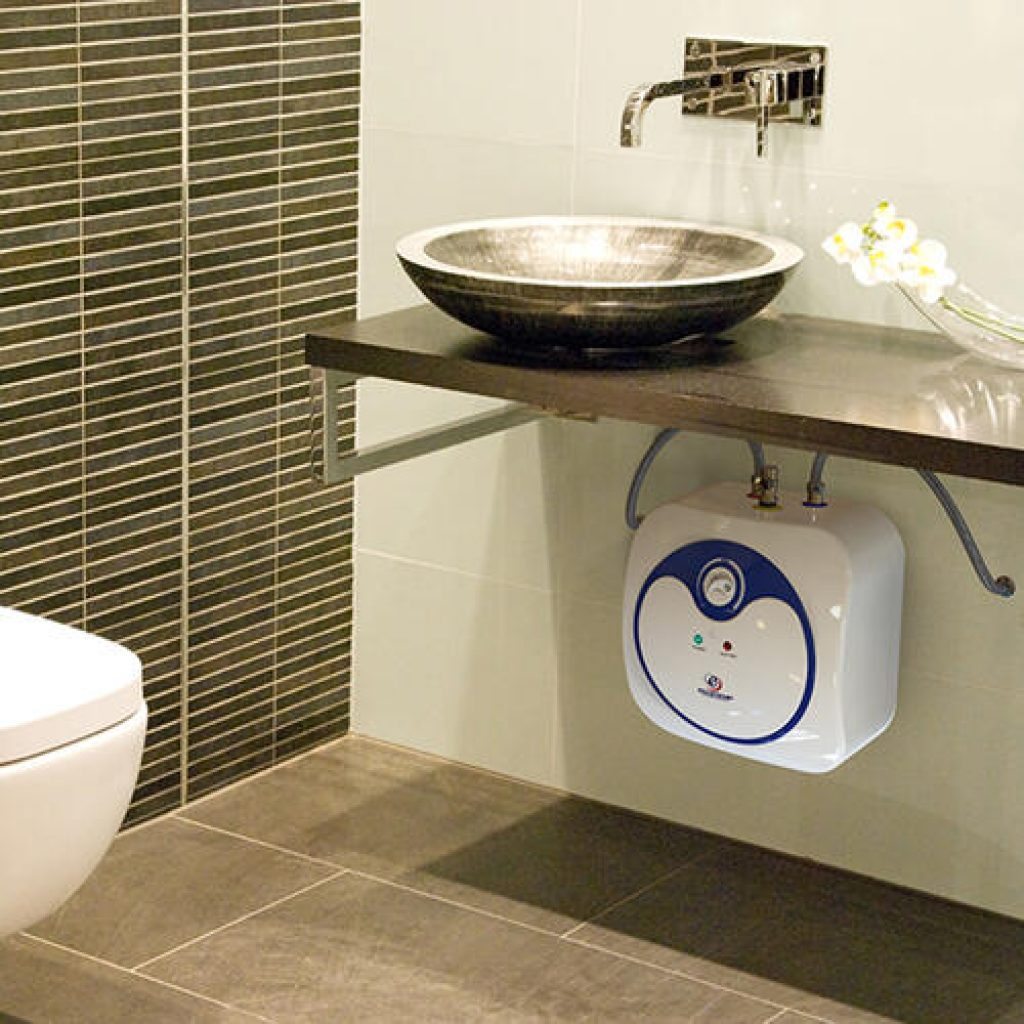
A point-of-use TWH is smaller than a whole-house system.
As such, they have a lower flow rate, so they can only cater to the needs of one faucet/outlet.
On the upside, they are cheaper, and their size means that they can be placed inside cramped spaces, like a closet or cabinet.
This type of water heater can come in handy for additional faucets that your current system may not cover.
For instance, a POU water heating system would be perfect for a property with a separate building/room.
Cost Implications & Breakdown
Here are 4 cost-related categories (from cheapest to most expensive) that we’ve created using the above factors.
- POU electric water heater
- POU gas-fired water heater
- Whole-house electric water heater
- Whole-house gas-fired water heater
Now let’s have a look at two cost-related tables.
Electric Tankless Water Heater Cost
| Price Point | Price (US$) |
|---|---|
| Highest | $2230 |
| Average | $500 |
| Lowest | $105 |
Gas-Fired Tankless Water Heater Cost
| Price Point | Price (US$) |
|---|---|
| Highest | $2730 |
| Average | $800 |
| Lowest | $134 |
How Much Do Tankless Water Heaters Cost To Install?
According to HomeAdvisor (2022), tankless water heater installation can cost anywhere between $1203 to $3469.
Are Tankless Water Heaters Worth The Cost?
To answer this question correctly, we need to evaluate the following variables:
- System lifespan
- Hot water availability
- Efficiency levels
- Installation Cost
- Versatility
System Lifespan
According to the U.S. Department Of Energy, the majority of TWHs have a lifespan of more than 20 years, making their lifespan substantially better than traditional water heaters (10-15 years).
Moreover, demand water heaters have easily replaceable parts. As such, these water heaters have the potential to run for longer than their estimated lifespan.
Hot Water Availability
It’s the middle of winter, you’ve just woken up, and you’re dying for a shower. But wait, there’s no hot water left!!! Why? Because the rest of your family have already used it all.
Unfortunately, this is an all too familiar situation that traditional tank water heater (TTWH) owners will face — chances are, every one of you reading this article has found yourself in this scenario, or at the very least, one similar to it.
Now, this is where TWHs really shine. The process by which these water heaters work means that they can provide you with a near endless stream of hot water on-demand!
This is in stark contrast to TTWHs that need to heat up and maintain the temperature of the water stored inside them, all while suffering from standby loss.
Efficiency Levels
Efficiency is key, no matter what you’re working with, be it rainwater harvesting, solar panels, or a greywater system.
Water heating is no different. Demand water heaters can increase the energy efficiency of homes that use 41 gallons or less of hot water per day by 24% to 34%.
If your household tends to use more water than that, fear not! These water heaters can increase the energy efficiency of homes that use around 86 gallons per day by 8% to 14%.
Installation Cost
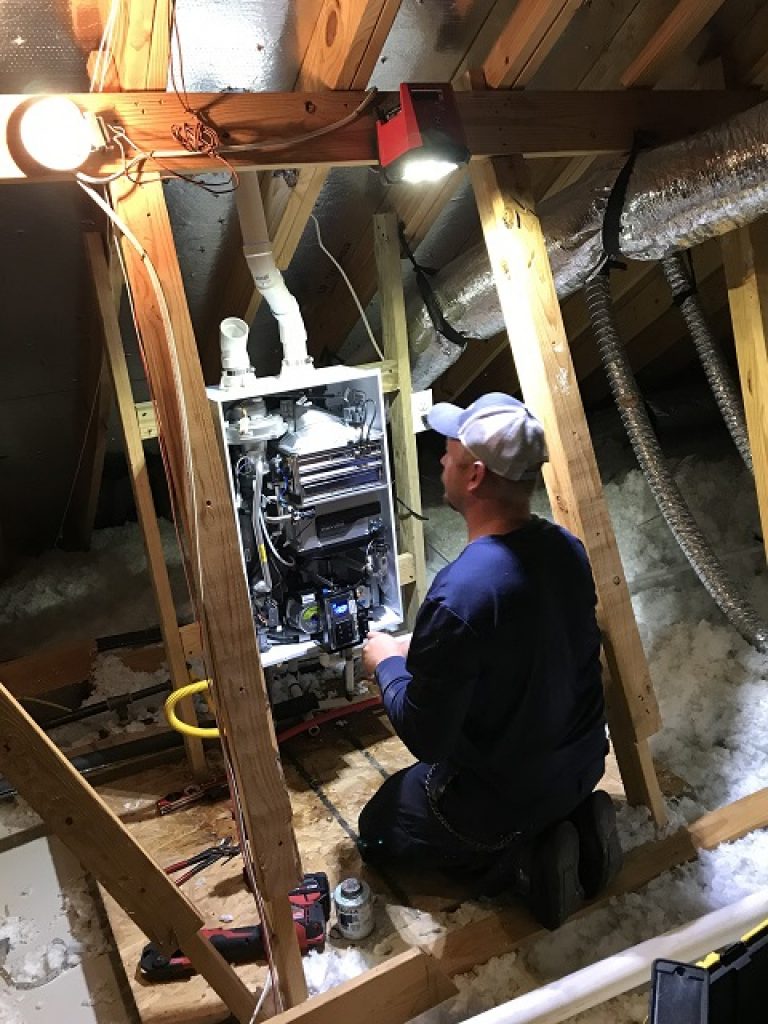
Source: Bradbury Brothers
Unfortunately, TWHs do not do well in this regard.
As previously mentioned, the cost of installing one of these systems is between $1203 to $3469. This is in stark contrast to the cost of storage-tank water heater installation ($829 to $1,632).
Versatility
Are you pressed for space? Don’t stress — demand water heaters are smaller and more modular than their storage tank counterparts.
Point-of-use water heaters are particularly adept at fitting into smaller spaces like a closet or under a sink.
You can also connect TWHs in parallel series — this will allow you to provide hot water to multiple faucets throughout your home.
In Summary
Tankless water heaters are most definitely worth the money!
How Much Money Can Tankless Water Heaters Save You?
A 2019 Consumer Reports article stated that tankless water heaters could save one at least $100 on their utility bill.
Additionally, we know (as previously mentioned) that demand water heaters can increase the energy efficiency of homes that use 41 gallons or less of hot water per day by 24% to 34%.
And if you use around 86 gallons per day, you’ll find that your tankless water heater is 8% to 14% more energy efficient.
Variables To Consider
While the Consumer Reports estimate may still hold up (to an extent), finding the honest answer is far more complex. To determine tankless water heater cost savings, you need to account for the following variables:
- Energy source: a gas-fired TWH costs more to operate than an electric TWH.
- Installation costs: does your TWH require additional gas lines, ventilation, or electric outlets?
- Size of unit: whole-house TWHs are bigger and more expensive to install and run than their smaller point-of-use counterparts due to the fact that they can provide water to multiple faucets.
- Gas unit sub-type: do you have a condensing or non-condensing gas unit? Condensing units are more efficient than their non-condensing counterparts.
- Retrofit: tankless water heater cost is poor for retrofit applications where a TTWH is operating safely. In these situations, a TWH won’t pay for itself in its lifetime without significantly reduced installation costs or a major increase in gas prices. However, the opposite is true when retrofit applications require power vented water heaters.
- Water Usage: If your home has higher water usage rates, you’ll benefit from improved payback.
In Summary
By now, we’re sure you have a much better appreciation of how difficult it is to estimate tankless water heater cost savings.
There are simply too many variables to consider, and as such, cost savings need to be determined on a case-by-case basis.
Are There Any Tax Rebates For Tankless Water Heaters?
Unfortunately, the current tax credits for Residential Energy Efficiency (Equipment Tax Credits for Primary Residences) expired on December 31, 2021.
As of January 5, 2022, there is no approved extension of these tax credits.
However, some companies are providing rebates on the purchase and installation of various gas-fired tankless water heaters. These rebates range from $100 – $1000.
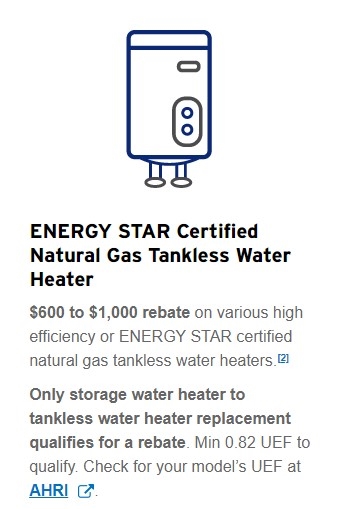
For more info, click here.
Final Thoughts
At $500 to $800 (on average) for gas and electric heaters, respectively, and installation costs of $1203 to $3469, it’s safe to say that tankless water heaters don’t come cheap.
In saying that, if you’re looking to revolutionize your water heating system at home with a nearly endless amount of on-demand hot water, then the costs are justified!
If you have a tankless water heating unit in your home, feel free to reach out to us in the comments section below — we’d love to hear about your experience with this system!

